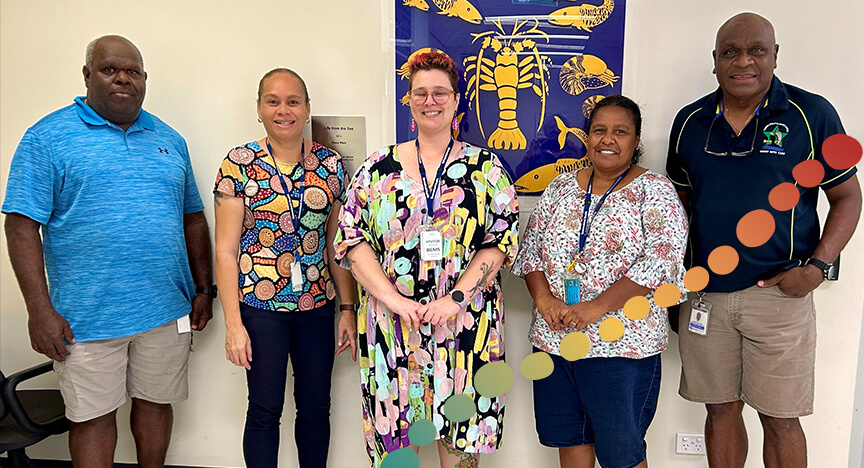
Some of the members of the Thursday Island Quality Lifestyle Program team – from left – Advanced Health Worker Olsen Sailor, Primary Health Care Programs North Director Maleta Abednego, Senior Dietitian Kayla Schroeter, Renal Health Worker Georgina Tabua and Renal Clinical Nurse Sam Mills.
Summary
- World Diabetes Day is on 14 November 2023.
- Thursday Island had the largest concentration of people with diabetes in the region.
- Physical activity helps to manage blood pressure and weight as well as general health.
Torres Strait, Cape York and Northern Peninsula Area residents have been reminded of the need to maintain healthy eating, drinking and lifestyle behaviours to avoid chronic diseases like diabetes.
Thursday Island Quality Lifestyle Program Advanced Health Worker, Olsen Sailor, said World Diabetes Day was observed on 14 November each year.
“But while World Diabetes Day is a good way to focus awareness, diabetes and chronic disease are issues Torres Strait, Cape York and NPA residents should be aware off all year round,’’ Mr Sailor said.
“Diabetes numbers continue to climb across the Torres Strait and on Thursday Island.
“Diabetes is the name given to a group of different conditions in which the body cannot maintain healthy levels of a type of sugar called glucose in the blood.
“The amount of sugar in the blood is controlled by a hormone called insulin, manufactured in your pancreas – a gland behind your stomach.
“When your body cannot make enough insulin, or if the insulin is not working properly, it cannot break down glucose into energy.
“Glucose then builds up into high blood glucose levels which can then cause diabetes.’’
Primary Health Care Programs North Director, Maleta Abednego, said Thursday Island had the largest concentration of people with diabetes in the Torres and Cape Hospital and Health Service region.
“Thursday Island is home to 381 people with diabetes – 336 of whom are Indigenous people – which is about 14.6 per cent of the total number of diabetics on our register in our health service,’’ she said.
“Across the health service as a whole, we currently have about 2608 active diabetes clients on our register.
“Across our region we need to find ways to reduce both the overall rate of diabetes in our communities and the poor health people experience because of the complications of diabetes.
“Proper healthy choices and physical activity can help you avoid getting diabetes in the first place and can also help you manage diabetes if you do have it.
“If people with diabetes eat healthy kai kai, have a healthy body weight, and are physically active they can be strong and healthy.
“If people with diabetes eat unhealthy kai kai and are not physically active, their blood sugars will be high and they will be unhealthy.
“They will suffer complications like stroke; blindness, heart disease, kidney disease, nerve damage, foot problems and risk having amputations.’’
Some ways of managing diabetes if you have it, or to help you avoid getting it:
- Limit your intake of bad carbohydrates such as sugary drinks, sweets and cordials, white rice and pasta and increase your intake of good carbohydrates such as wholegrain bread, brown rice and porridge.
- Managing weight – If you are overweight or obese, losing weight is one of the best ways to improve your blood sugars and health and reduce your risk of complications. Maintaining good portion control and limiting junk foods is the best way to keep your weight in check.
- Avoid saturated and trans fats: Foods high in saturated fats include butter, coconut milk and cream, fatty meats, cream, cakes and biscuits and pastry’s like pies and sausage rolls.
- Physical activity helps to manage blood pressure and weight as well as general health.
- Alcohol should be limited to no more than 2 standard drinks per day and everyone should have regular alcohol-free days.
- Smoking causes heart attacks, stroke and damage to your blood vessels in the body. If you are trying to cut down, see your doctor or visit your local health centre for advise on how to quit.
- Attend regular check-ups, take your medications and monitor your blood sugars as advised by your health care teams. Regular health checks are offered once a year to all ages from 15 years and over so as to identify health problems early on that might lead to a disease.
- See a dietitian for individualised advice about how much carbohydrate you should be eating.
Diabetes currently is the world’s fastest-growing chronic disease and already the seventh leading cause of death in Australia.
“Type 2 diabetes is the most prevalent form of diabetes. It can usually be managed by maintaining a healthy weight, with medication when necessary. Type 1 diabetes is less common, generally about 10 per cent of all diabetes cases, and must be managed with regular doses of insulin,’’ Ms Abednego said.
“Aboriginal and Torres Strait Islander people are particularly at risk of developing diabetes and this genetic predisposition is compounded by a range of other factors such as generational disadvantage, poor nutrition, obesity and lack of exercise.
“If you are an Aboriginal or Torres Strait Islander person it is three times more likely that you will have Type 2 diabetes than your non-Indigenous neighbour. The other thing about diabetes in Aboriginal and Torres Strait Islander families is that it occurs at a younger age in Indigenous families and can be preventable.
“If not managed properly, diabetes can lead on to end-stage kidney failure, which would then require people going on renal dialysis for life, unless they can have a kidney transplant. It makes sense, therefore, for us to do everything possible to reduce the rate of diabetes in our communities, as well as to assist those with diabetes to self manage so that they do not develop complications.’’